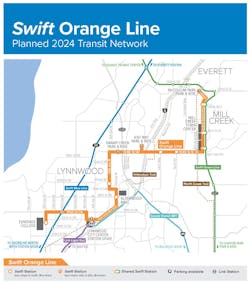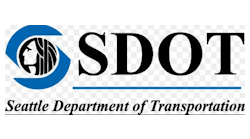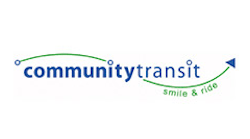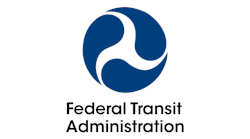Four BRT projects allocated $187 million from FTA CIG Small Starts Program
Four bus rapid transit (BRT) projects in California, Utah and Washington state have received a total of $187 million in allocations through the Federal Transit Administration’s (FTA) Capital Investment Grants (CIG) Small Starts Program. The four projects include San Bernardino County Transportation Authority’s (SBCTA) West Valley Connector BRT project, Utah Transit Authority’s (UTA) Ogden/Weber State University BRT project, Community Transit’s Swift Orange Line BRT project and the city of Seattle Department of Transportation’s (SDOT) Madison Street BRT project.
“Millions of Americans rely on public transit to get to work, services and family – and communities need support to create more public transit options. The Biden-Harris Administration is committed to modernizing and expanding our public transit systems, and that includes support for these great projects,” said U.S. Transportation Secretary Pete Buttigieg.
The four BRT projects receiving allocations are nearing completion of the statutory and regulatory requirements to receive a grant agreement. The projects must meet these additional requirements before a grant can be awarded.
“The local communities will greatly benefit from improved access and mobility to transit service, helping people reach vaccination sites, jobs, schools and other important destinations,” said FTA Acting Administrator Nuria Fernandez.
The projects and their allocations
SBCTA will receive an $86.75-million allocation for the 19-mile Phase 1 of West Valley Connector BRT project, which will connect Pomona to Rancho Cucamonga, Calif., using 40-foot zero-emissions vehicles as part of Omnitrans’ sbX BRT service. The funding provided by FTA through the CIG Program will cover one-third of the project's $262.67 million capital cost for the first phase. Phase 1 includes the construction of 21 stations and will upgrade a portion of existing Route 61 by adding approximately 2.5 miles of center running, dedicated bus-only lanes. The BRT will improve transit connections to Ontario International Airport (ONT), two Metrolink lines (San Bernardino and Riverside) and multiple major activity centers along Route 61 including Ontario Mills and Victoria Gardens.
"In addition to the ONT Loop, the Arrow line and the proposed Vegas rail project, the [West Valley] Connector will play an important role in one of the most dynamic transit stories in the United States,” said Frank J. Navarro, president of SBCTA.
UTA will receive a $3.2-million allocation for the 5.3-mile Ogden/Weber State University BRT project, which recently began construction. UTA plans to have multiple segments of the project under construction simultaneously to have the BRT line in operation by late 2023. UTA received a $10.6-million allocation from FTA in December 2020 for the project, which will run electric buses from the Ogden FrontRunner Station, through downtown, along dedicated bus lanes to Weber State University and McKay-Dee Hospital. Once open, the BRT line will operate fare free for the first three years, which is possible through a federal grant. After the grant expires, Weber State University students will continue to ride for free with their EDpass.
The fourth project to receive allocation is also in Washington state with the SDOT set to receive a $59.9-million allocation for the 2.3-mile Madison Street BRT project, which represents 45 percent of the project cost. The Madison Street BRT, also known as the RapidRide G Line, is one of several transit projects that will be funded by the voter-approved Levy to Move Seattle. The future BRT line will operate diesel-electric buses and provide connections to hospitals, schools, businesses and other destinations as well as to dozens of bus routes, the First Hill Streetcar and ferry service at the Colman Dock Ferry Terminal. The project also includes sidewalk improvements, curb ramps, new crossing signals and curb bulbs (extended sidewalk corners) that make people walking and rolling more visible as they move to and from bus stops. Construction is expected to begin this fall with service beginning in 2024.
“While Seattle builds the best transit and transportation infrastructure in the country, support from our federal partners has become even more critical,” said Seattle Mayor Jenny Durkan. “As we deal with the effects of COVID-19, it is more important than ever to invest in a transportation system that gets our frontline workers, historically underserved communities and communities of color where they need to go quickly and reliably.”

Mischa Wanek-Libman | Group Editorial Director
Mischa Wanek-Libman is director of communications with Transdev North America. She has more than 20 years of experience working in the transportation industry covering construction projects, engineering challenges, transit and rail operations and best practices.
Wanek-Libman has held top editorial positions at freight rail and public transportation business-to-business publications including as editor-in-chief and editorial director of Mass Transit from 2018-2024. She has been recognized for editorial excellence through her individual work, as well as for collaborative content.
She is an active member of the American Public Transportation Association's Marketing and Communications Committee and served 14 years as a Board Observer on the National Railroad Construction and Maintenance Association (NRC) Board of Directors.
She is a graduate of Drake University in Des Moines, Iowa, where she earned a Bachelor of Arts degree in Journalism and Mass Communication.







